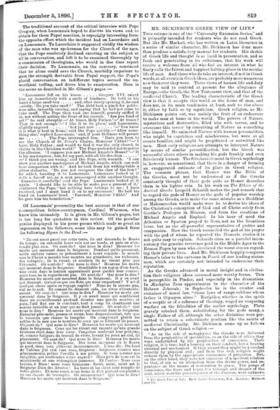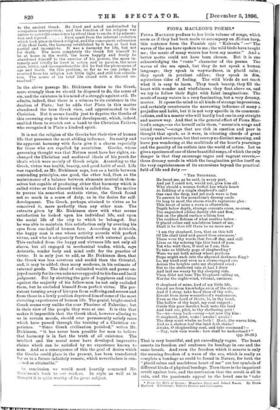MR. DICKINSON'S GREEK VIEW OF LIFE.*
THIS volume is one of the " University Extension Series," and is primarily intended for students who do not read Greek. But like Mr. Mackail, who has written on Latin literature in a series of similar character, Mr. Dickinson has done more than produce a satisfactory manual for students. His sketch of Greek life and thought is so lucid in presentation, and so fresh and penetrating in its criticisms, that his work will receive a welcome from all who feel an interest in what he finely calls the fairest and happiest halting-place in the secular life of man. And those who do take an interest, if not in Greek words, at all events in Greek ideas, are probably more numerous now than ever they were. Three views of human life and duty may be said to contend at present for the allegiance of Europe,—the Greek, the New Testament view, and that of the mediteval Church. The leading characteristic of the Greek view is that it accepts this world as the home of man, and does not, in its main tendencies at least, seek to rise above it, either by faith or by mysticism. Greek religion, as Mr. Dickinson points out, was mainly the fruit of an endeavour to make man at home in the world. The powers of Nature, mysterious and destructive, filled him with terror, and he overcame this terror by conceiving of Nature as something like himself. He animated Nature with human personalities, who might be capricious and mischievous, but were at all events familiar, and might be propitiated or outwitted like
men. Most early religions are attempts to interpret Nature by means of similar personification, but the Greek was successful above others in making his gods frankly and even frivolously human. The frivolous element in Greek mythology is, however, so sensational, that there is a danger of forming an exaggerated estimate of its place in Greek religion. The common phrase, that Homer was the Bible of
the Greeks, must not be understood as if the Greeks constantly thought of their gods quite as Homer describes them in his lighter vein. In his work on The Ethics of the Ancient Greeks Leopold Schmidt makes the just remark that to regard the gods of Homer as the gods of popular worship among the Greeks, is to make the same mistake as a Buddhist or Mahommedan would make were he to derive his ideas of
the Christian's conception of God and of Christ solely from Goethe's Prologue in Heaven, and from the creations of Michael Angelo and Raphael. In his 'hour of need the
Athenian or Spartan prayed to Zeus, not as the licentious lover, but as the all-powerful representative of justice and compassion. How the Greek reconciled the god of his prayer with the god of whom he repeated the Homeric stories it is not quite easy to explain. Schmidt cites as a parallel incon- sistency the genuine reverence paid in the Middle Ages to the Roman Popes by men who circulated the worst stories regard- ing their private lives. And Mr. Dickinson happily compares Homer's tales to the cartoons in Punch of our leading states- men, which are certainly not intended to undermine their
reputation.
As the Greeks advanced in moral insight and in civilisa- tion their religious ideas assumed more worthy forms. This is perceptible in Pinder, and especially in the dramatists.
In Aschylus Zeus approximates to the character of the Hebrew Jehovah ; in Sophocles he is the creator and sustainer of moral law, "those laws of range sublime whose father is Olympus alone." Euripides, whether in the spirit
of a sceptic or of a reformer of theology, waged an unsparing warfare on the frivolities of the earlier mythology. Plato gravely rebuked them, substituting for the gods many, a. single Father of all, although the other divinities were per- mitted to retain a subordinate position like the saints of medixval Christianity. Mr. Dickinson sums up as follows
on the subject of Greek religion :—
" As on the side of metaphysics the Greeks were delivered from the perplexities of speculation, so on the side of ethics they were undisturbed by the perplexities of conscience. Their religion, it is true, had a bearing on their conduct, but a bearing external and mechanical. If they sinned they might be punished directly by physical evil ; and from this evil, religion might redeem them by the appropriate ceremonies of purgation. But, on the other hand, they were not conscious of a spiritual relation to God, of sin as an alienation from the divine power, and re- pentance as the means of restoration to grace. The pangs of conscience, the fears and hopes, the triumph and despair of the soul, which were the preoccupation of the Puritan, were unknown • The Greek View of Life. By G. Lowe DicLit.son, M.A. London: Mahlon and Co. to the ancient Greek. He lived and acted undisturbed by scrupulous introspection ; and the function of his religion was rather to quiet the conscience by ritual than to excite it by admoni- tion and reproof Even apart from the internal evolution which took place in Greek religion, and the consequent subversion of its ideal basis, the harmony established by it was at best but partial and incomplete. It was a harmony for life, but not for death. The more completely the Greek felt himself to be at home in the world, the more happily and freely he abandoned himself to the exercise of his powers, the more in- tensely and vividly he lived in action and in passion, the more alien, bitter, and incomprehensible did he find the phenomena of age and death. On this problem, so far as we can judge, he received from his religion but little light, and still less consola- tion. The music of his brief life closed with a discord un- resolved."
In the above passage Mr. Dickinson denies to the Greek, more strongly than we should be disposed to do, the sense of sin, and the existence in his mind of a struggle against evil. He admits, indeed, that there is a witness to its existence in the
dualism of Plato ; but he adds that Plato in this matter abandoned the true Greek view, and approximated to the Christian. But it seems hardly just to deprive the Greeks of this crowning step in their moral development, which, indeed, enabled them to stretch out a hand to the Christian Fathers, who recognised in Plato a kindred spirit.
It is not the religion of the Greeks but their view of human life that possesses the most abiding influence. Its sanity and its apparent harmony with facts give it a charm especially for those who are repelled by asceticism. Goethe, whose governing thought was that Nature must have her rights, ex- changed the Christian and medieval ideals of his youth for ideals which were mainly of Greek origin. According to the Greek, virtue was health, beauty, and good habit of soul. Life was regarded, as Mr. Dickinson says, less as a battle between contending principles, one good, the other bad, than as the maintenance of a balance between elements neutral in them- selves but capable of producing either that harmony which is called virtue or that discord which is called vice. The motive to pursue his somewhat aesthetic virtue, the Greek found not so much in a sense of duty, as in the desire for self- development. The Greek, perhaps, attained to virtue as he conceived it, more perfectly than any other man. The extracts given by Mr. Dickinson show with what serene satisfaction he looked upon his individual life, and upon the social life of the city to which he belonged. But he was able to maintain this satisfaction only by averting his eyes from one-half of human fate. According to Aristotle, the happy man is one whose activity accords with perfect virtue, and who is adequately furnished with external goods.
This excluded from the happy and virtuous life not only all slaves, but all engaged in mechanical trades, which, says Aristotle, render body and mind unfit for the practice of virtue. It is only just to add, as Mr. Dickinson does, that the Greek was less covetous and sordid than the Oriental, and, it may be added, than many moderns, in his estimate of external goods. The ideal of unlimited wealth and power en- joyed merely for its own sake never appealed to his fine and lucid judgment. But by shutting the gate of happiness and virtue against the majority of his fellow-men he not only excluded them, but be excluded himself from perfect virtue. His per- sistent turning away of his eyes from suffering and sorrow and from those in a lowly position deprived him of some of the most elevating experiences of human life. The genial, bright-souled Greek seems very unlike the sour Pharisee of Palestine ; but in their view of the people they were at one. It is this that makes it impossible that the Greek ideal, however alluring to us in certain moods, should ever permanently satisfy races which have passed through the training of a Christian ex- perience. "Since Greek civilisation perished," writes Mr. Dickinson, "it has never been possible for man to believe that harmony is in fact the truth of all existence. The intellect and the moral sense have developed imperative claims which can be satisfied by no experience known to man. And as a consequence of this the goal of desire which the Greeks could place in the present, has been transferred for us to a future infinitely remote, which nevertheless is con- , elved as attainable."
In conclusion we would most heartily commend Mr. Dickinson's book to our readers. In style as well as in thought it is quite worthy of its great subject.























































 Previous page
Previous page